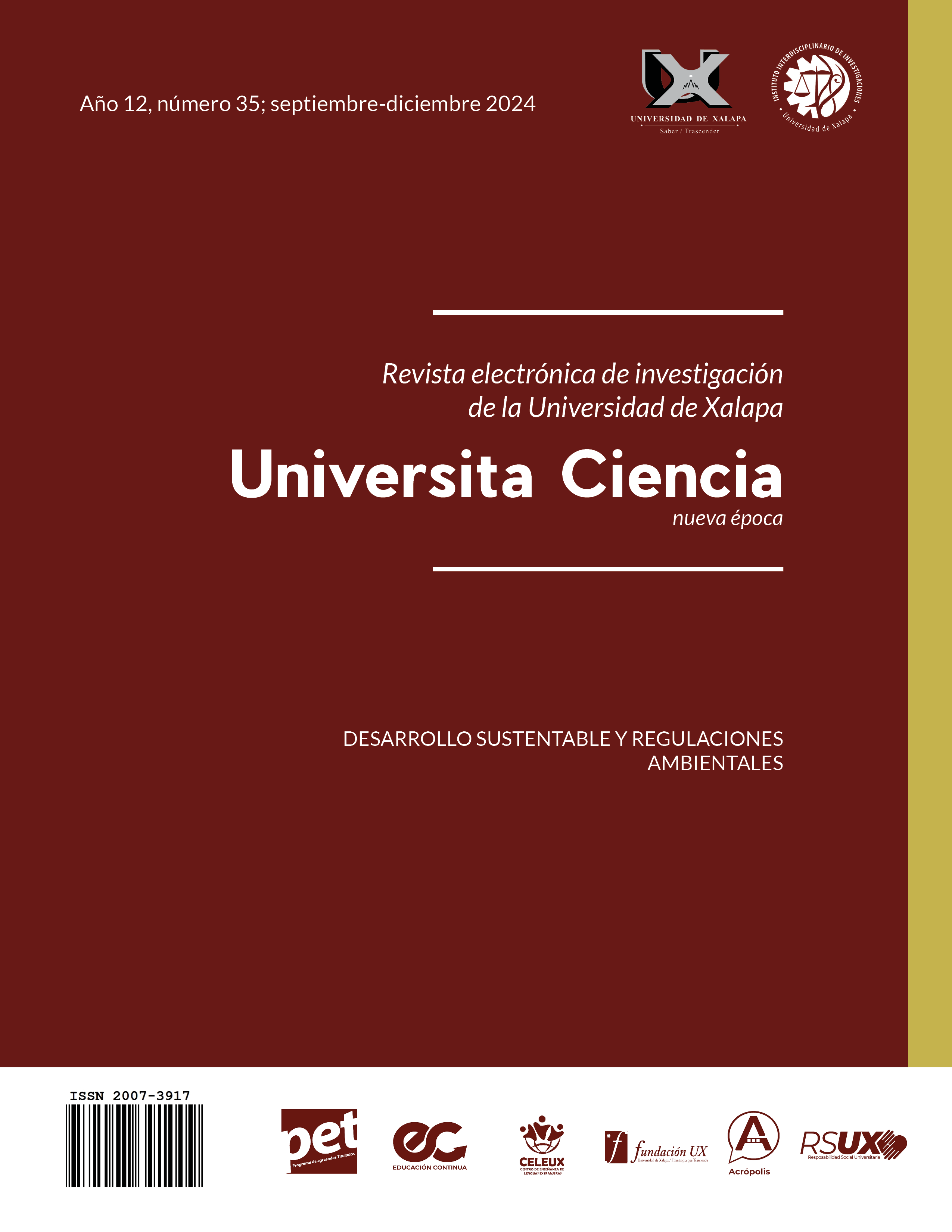Regulatory framework for environmental education in México: critical review of its scope and limitations for sustainable development
DOI:
https://doi.org/10.5281/zenodo.14231469Keywords:
Environmental education, sustainable development, educational legislation, MexicoAbstract
This work analyzes the legal framework of environmental education in Mexico. The research question is: To what extent is the regulatory framework of environmental education in Mexico adequate and sufficient to promote this type of training processes in the country? The objective is to carry out a critical review of the legal framework that regulates environmental education in Mexico, evaluating its scope and limitations. For this purpose, regulatory analysis and a comparative approach are used with legislation from other Latin American countries; international treaties on the subject are reviewed, as well as the Mexican Constitution, the General Law of Education and the General Law of Ecological Balance and Environmental Protection.
The results point to concluding that although Mexico participates in international agreements on environmental education, these are not legally binding, which weakens their application; Furthermore, the Mexican regulatory framework has gaps in its formulation by not considering aspects such as the implementation, evaluation and monitoring of educational programs. Compared to other Latin American countries, Mexico lags in creating a robust regulatory system for environmental education, which limits its effectiveness in promoting sustainable development.
Metrics
References
Arnouil, M. (2018). Hacia un currículo ambientalmente sustentable para las carreras de Derecho. Revista Pedagogía Universitaria y Didáctica Del Derecho, 1(5), 5–18.
Calvo, S., Ferreras, J., & Rodrigo-Cano, D. (2020). La Educación Ambiental enlas redes sociales: #EA26. Revista de Educación Ambiental y Sostenibilidad, 2(1), 1301-15.
Constitución de la Nación Argentina. (05 de septiembre de 2024). Artículo 41. Honorable Senado de la Nación Argentina.
Constitución de la República Bolivariana de Venezuela (05 de septiembre de 2024). Art. 107. Asamblea Nacional.
Constitución de la República Dominicana . (04 de septiembre de 2025). Art.67. Congreso Nacional.
Constitución Política de la República de Nicaragua . (05 de septiembre de 2024). Artículo 60. Asamble Nacional.
Constitución Política de la República Federativa de Brasil. (05 de septiembre de 2024). Artículo 225. Congreso de la República Federativa.
Constitución Política de los Estados Unidos Mexicanos. (05 de septiembre de 2024). Artículo 3o. Congreso de la Unión.
Constitución Política del Estado Plurinacional de Bolivia. (05 de septiembre de 2024). Artículo 80. Asamblea legislativa prurinacional.
Freire, P. (2018). Pedagogía del oprimido (Edición conmemorativa). Siglo XXI editores.
García-Arce, J., & Gutiérrez-Barba, B. (2023). Filosofía institucional y objetivos de desarrollo sostenible: nexos subyacentes. Alteridad Revista de Educación, 18(1), 72-84.
Ley General de Educación. (5 de septiembre de 2024). Artículo 30. México: Congreso de la Unión.
Ley General de Equlibrio Ecológico y protección al Ambiente. (05 de septiembre de 2024). Artículo 3o. México: Congreso de la Unión.
ONU. (5 de Junio de 1972). Declaración de Estocolmo sobre el Medio Humano. Recuperado el 2024 de Septiebre de 04, de http://www.un-documents.net/unchedec.htm
ONU. (14 de Junio de 1992). Agenda 21. Recuperado el 04 de Septiembre de 2024, de https://sustainabledevelopment.un.org/outcomedocuments/agenda21
ONU. (25 de junio de 1998). Convención de Aarhus sobre el acceso a la información, la participación del público en la toma de decisiones y el acceso a la justicia en asuntos ambientales. Recuperado el 04 de septiembre de 2024, de https://unece.org/environment-policy/public-participation/aarhus-convention/introduction
ONU. (25 de septiembre de 2015). Transformar nuestro mundo: La Agenda 2030 para el Desarrollo Sostenible. Recuperado el 04 de septiembre de 2024, de https://sdgs.un.org/2030agenda
PNUMA. (22 de Octubre de 1975). Carta de Belgrado: Un marco general para la educación ambiental. https://www.gdrc.org/uem/ee/belgrade.html
Reyes, Y. (2022). Las medidas estatales no vinculantes que afectan el comercio internacional: el incumplimiento de los acuerdos comerciales por parte de los Estados. Agenda Internacional, 29(40), 111-132. doi:https://doi.org/10.18800/agenda.202201.005
Suprema Corte de Justicia de la Nación. (05 de septiembre de 2024). Semanario Judicial de la Federación. SCJN.
Tamayo, R. (2007). Teoría jurídica y derecho comparado una aproximación y un deslinde. Isonomía. Revista de Teoría y Filosofía del Derecho, (27), 29-40.
UNESCO (1977, 26 de octubre). Tbilisi Declaration: Intergovernmental Conference on Environmental Education. de https://unesdoc.unesco.org/ark:/48223/pf0000032763
UNESCO (1997, 8 de diciembre). Declaración de Salónica: Educación y Sostenibilidad. de https://unesdoc.unesco.org/ark:/48223/pf0000118065
UNESCO (2009, 31 de marzo). Conferencia Mundial de Bonn sobre la Educación para el Desarrollo Sostenible: Declaración de Bonn. https://unesdoc.unesco.org/ark:/48223/pf0000184028
Published
How to Cite
Issue
Section
License

This work is licensed under a Creative Commons Attribution-NonCommercial-ShareAlike 4.0 International License.
This journal adheres to the Creative Commons license in the definition of its policy of open access and reuse of published material, in the following terms:
- Accessibility to articles and other publications in whole or in part under the concept of copying, distribution, public communication , interactive access (through the Internet or other means), explicitly maintaining the recognition of the author or authors and the journal itself (authorship acknowledgment).
- Warning that if the articles are remixed, modified or fragments used in other creations, the modified material cannot be distributed, nor is it allowed to reconstruct versions from the original published articles (derived works).
- The use of the contents of the published articles, in whole or in part, for profit (non-commercial recognition) is prohibited.
The author retains copyright, transfers or grants exclusive commercial rights to the publisher, and a non-commercial license is used.














